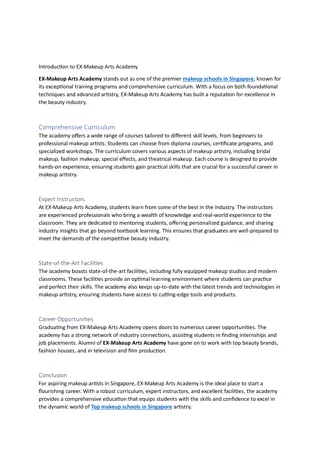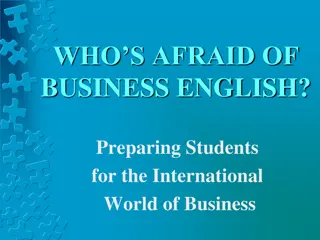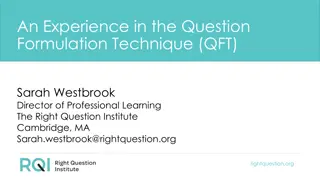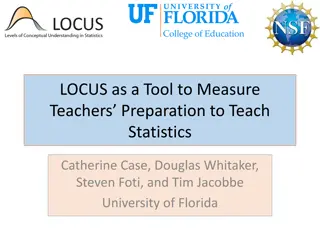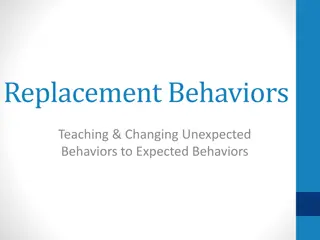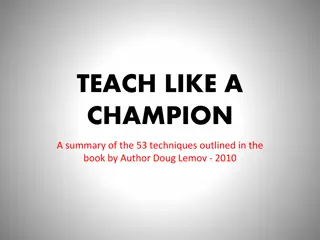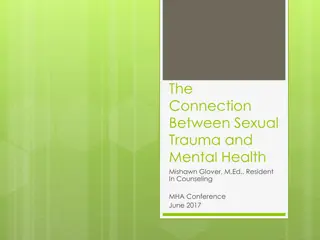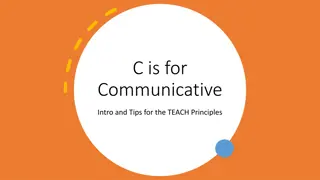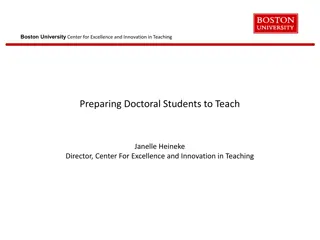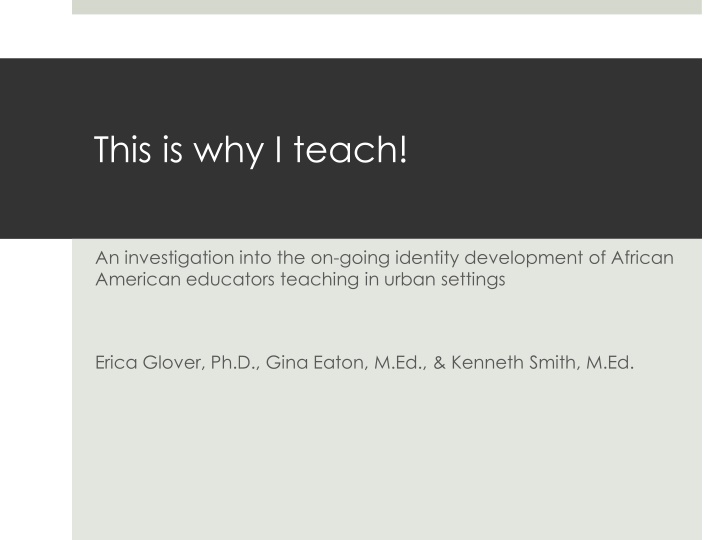
Identity Development of African American Educators in Urban Settings
This study examines the ongoing identity development of African American educators teaching in urban settings. It explores how biographical and professional experiences influence their identity, beliefs, and pedagogy. The research delves into the interactions between systems and relationships in urban settings, including home, social gatherings, community, and school. Qualitative interviews with educators from three urban cities with similar demographics reveal insights into the impact of experiences on identity development.
Download Presentation

Please find below an Image/Link to download the presentation.
The content on the website is provided AS IS for your information and personal use only. It may not be sold, licensed, or shared on other websites without obtaining consent from the author. If you encounter any issues during the download, it is possible that the publisher has removed the file from their server.
You are allowed to download the files provided on this website for personal or commercial use, subject to the condition that they are used lawfully. All files are the property of their respective owners.
The content on the website is provided AS IS for your information and personal use only. It may not be sold, licensed, or shared on other websites without obtaining consent from the author.
E N D
Presentation Transcript
This is why I teach! An investigation into the on-going identity development of African American educators teaching in urban settings Erica Glover, Ph.D., Gina Eaton, M.Ed., & Kenneth Smith, M.Ed.
About us Erica Glover, Ph.D. Gina Eaton, M.Ed Kenneth Smith, M.Ed.
Session Format The Study Purpose Background Findings In Practice Pre-service teachers In-service teachers Questions/Comments
Purpose for today Explore the importance of experience To understand what this may look/sound like in practice Pre-service teachers In-service teachers Students situated in urban settings
Research Question How do the biographical and professional experiences of African American teachers influence their ongoing development of identity, beliefs, and pedagogy in the urban setting?
4 years, 9 months, & X number of minutes later? After reflecting on my own experiences, and those that I hear from others ..What did I walk away with after this study? EXPERIENCES influence identity development!!
Research explored Identity Racial Identity Adolescent Adults Context Interaction between systems and relationships
Research explored: urban settings Home Perso n Social Gatherings Community School
The Study Qualitative Narrative Participants 3 different urban cities with similar demographics Individual interviews 6 total, 5 women and 1 male Focus Group 6 total, 4 men and 2 women Criteria: At least 5-20 years teaching experience Middle/high school teacher
Findings Themes 1. Institutionalized racism interrupting a trajectory of success 2. The ongoing development of African American teacher identity 3. Disrupting institutionalized racism Iterative experiences
Theme: Institutionalized Racism Interrupting a Trajectory of Success Defined: Experiences within divisive environments (educational institutions) as adolescents and later as adults, where political efforts were developed to provide more equitable opportunities; however, interruptive encounters occurred that actually compromise equity Encounters within urban context and 1. School Closure 2. Cultural Differences 3. Hidden Racism
Theme: Institutionalized Racism Interrupting a Trajectory of Success School closure and cultural differences You were like forced to kind of ... you had to stick with your own because everybody was just having conflict. Sometimes you didn't even understand the conflict, you didn t even understand the dynamics of it so you just needed to stick with somebody so you weren't out there on your own, yeah. This would have been 1981. So a lot of fighting between more fighting between blacks and blacks than the blacks and the whites. -Shelley
Theme: Institutionalized Racism Interrupting a Trajectory of Success Hidden racism And back then, African-Americans weren't in very many honors classes, and in order for you to be in an honors class, they wanted [me] to jump through hoops. But see, my parents were educated, and I was required beforehand, I should have been in those classes, but they wanted to make it a big deal for you to even get in those classes a lot of underlying racial tension. I mean it wasn't overt, but there were some issues, because you could count the number of African-Americans that were in the honors classes, maybe three or four in my grade level. -Karen
Theme: The Ongoing Development of African American Teacher Identity Defined: The influence of relationships on participants as adolescents, and how such relationships continue to influence participants beliefs and pedagogy Relationships as Adolescents 1. Support from friends 2. Absence of support from teachers 3. Expectations a. Of others b. Of self c. Of parents
Theme: Disrupting Institutionalized Racism Defined: Experiences within divisive environments (educational institutions) as adolescents and later as adults, where political efforts were developed to provide more equitable opportunities; however, interruptive encounters occur that actually compromise equity Support provided by participants to students to disrupt institutional racism
(As teachers) Disrupters autobiographical experience informs current methods of supporting urban youth Relationships as Professionals Disrupters (defined) Interrupt [disrupt] the interruptive inequitable encounters for students Able to wear various hats that fit the needs of students a. Hat Game Ability of participants to use different experiences as strategies to support students i. Community Hat ii. Family Hat
The Professional Context: The Backdrop The Influence of Desegregation Exploration provides a lens for understanding how desegregation influenced learning experiences (then and now) What policymakers and districts may not consider Cultural differences Influence of displacement The need to disrupt interruptive oppressive systems Limited training provided to teachers working with urban students Diverse cultural frames among students and teachers Limited amount of authentic communal experiences (white teachers)
Finding the right fit: sense of belonging Disrupters are teachers who 1. Do more than teach 2. Reflect culturally competence 3. Act as cultural brokers (Moje & Marti ez, 2007) 4. Disrupt inequitable learning experiences 5. Instill in students a sense of belonging
Community Hat: Cultural Brokers (Moje & Martinez, 2007) 1. Be visible (school/home/community) 2. Experience with navigating through oppressive social systems 3. Connecting home and school zones (Moje & Martinez, 2007) 4. Double-consciousness code switch (Du Bois, 1903) 5. Personal experiences activates genuine interest
Community Hat: Empowerment Agents (Stanton-Salazar, 2011) Empower students to move beyond where they are at 1. Critiquing the curriculum (culturally sustaining pedagogy) 2. Blueprint to navigate 3. Engage youth in critical analysis of self and others
Family Hat: Just like Family Female Participants Male Participants Mother, Aunt, Sister role Father, Uncle Advocate, Protect, and Nurture The provider connect urban youth to resources Visible within the community Positive Male role model
Family Hat I think as an educator, you wear different hats throughout the day. Sometimes I'm their counselor, sometimes I'm the mom, sometimes I'm their pastor or whatever, sometimes I'm the nurse, sometimes I'm their psychologist. So, you know, it's learning to put on those hats at the appropriate times, and I wear my motivating hat all of the time. I think my experiences as an African-American woman period, because African-American teachers definitely have that mom role, like I said, those different hats I wear, and that's definitely an African-American thing. -Karen 24
Intersectionality Female Participants Male Participants Take on the auntie or mother role and yet they are marginalized by their gender or race in both the racial and gendered relations between white males. May embrace the role of father or uncle and also experience racism that makes them a suspect or dangerous, or better at disciplining than teaching.
Debunking the Stereotypes of Black Men Mine, it's important because of perception of the black male. I had an experience this past year where we have a co-teaching setting and my co-teacher was white and the students have this perception that my co-teacher knew more than I knew. But I feel like that's talk and I feel like it's important to have African-American teachers because the kids need to understand that people to look like them are smart. And then also too I grew up being ... you know teaching in the neighborhood I grew up in. I grew up with a lot of the kids parents, so I'm teaching the people that I grew up with, I'm teaching their kids. So it's like Well my dad acts like this, or My dad is in jail. So it's like since you was his boy, it's that perception. And just to try to more debunk the stereotype that you have of yourself. -Brian
Theme: Disrupting Institutionalized Racism Disrupters in the Professional Context 1. Critiquing the Curriculum a. State requirements b. Teacher Autonomy 2. Agents of change: be opposite of what I had experienced. 3. Diversity Matters
Get that wall up! 1. Early adulthood: internalization Attempt to assimilate; code-switch within professional context 2. Middle adulthood: pre-encounter Level of acceptance among whites is important 3. Middle adulthood: immersion/emersion Accepted by whites but acknowledge blackness Collaborative relationships with colleagues 4. Late adulthood: immersion/emersion Intense emotions associated with race, teacher beliefs and approaches Beliefs observed through teaching practices, such as social just curriculum Disrupters
Disrupter in action: Preparing teacher educators Personalizing relationships Tasks for action beyond awareness Storytelling Cultural competence advocate Empowerment agent
Personalizing Relationships Set appointments with individuals Build rapport Share my experience/inquire about their experience Offer to assist in finding solutions (planning or otherwise)
Tasks for action beyond awareness Risky Stretch Course assignments Classroom discussion Supervisory Question/Dialogue Devil s advocate Who? And Why?
Storytelling Provide personal experience or those of others Encourage relationships Moving from theoretical to practical JD Travis
Cultural competence advocate Cool pose Stereotype threat Implications
Empowerment agent Resources Opportunities Contacts
Disrupter in action: culturally sustaining pedagogies
Conclusion Authentic relationships matter (sense of belonging) Pedagogy of the oppressed Hat Game Strategies to recruit, train, and retain minority teachers Oppression within social institutions

![❤[PDF]⚡ Escaping from Eden: Does Genesis Teach that the Human Race was Created](/thumb/21697/pdf-escaping-from-eden-does-genesis-teach-that-the-human-race-was-created.jpg)

